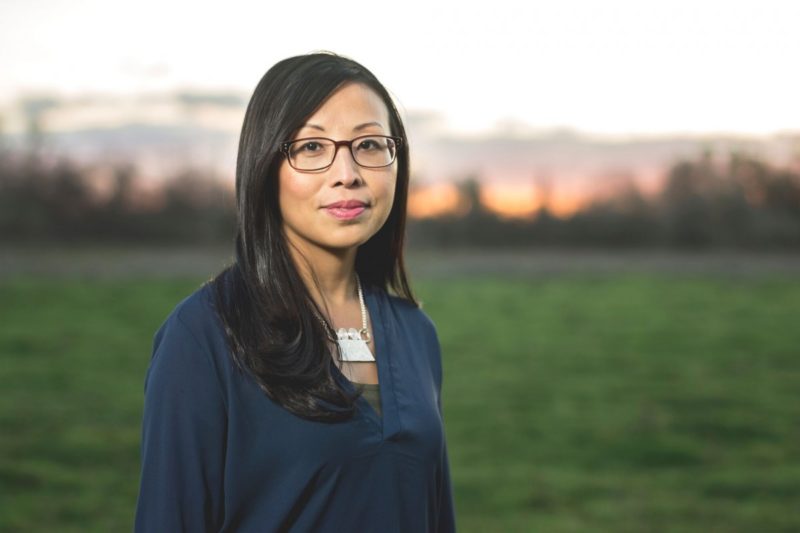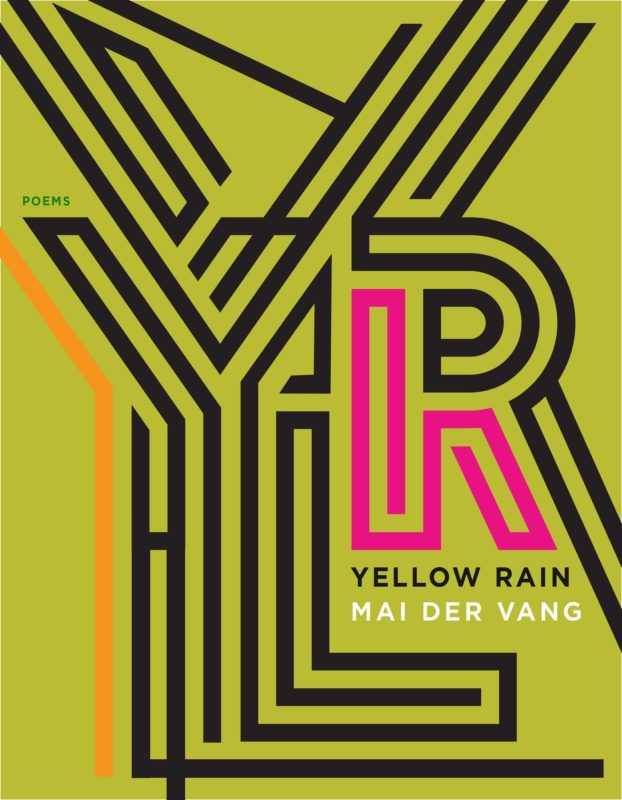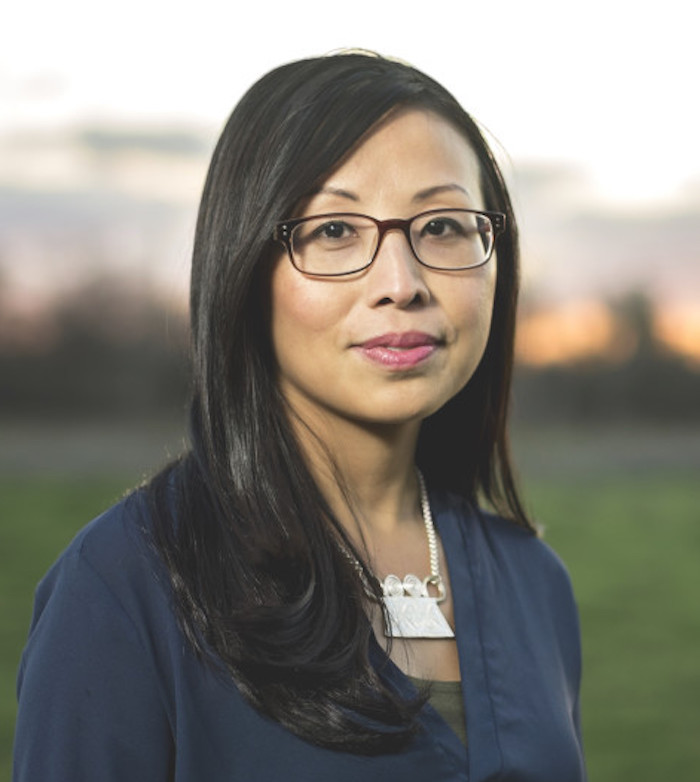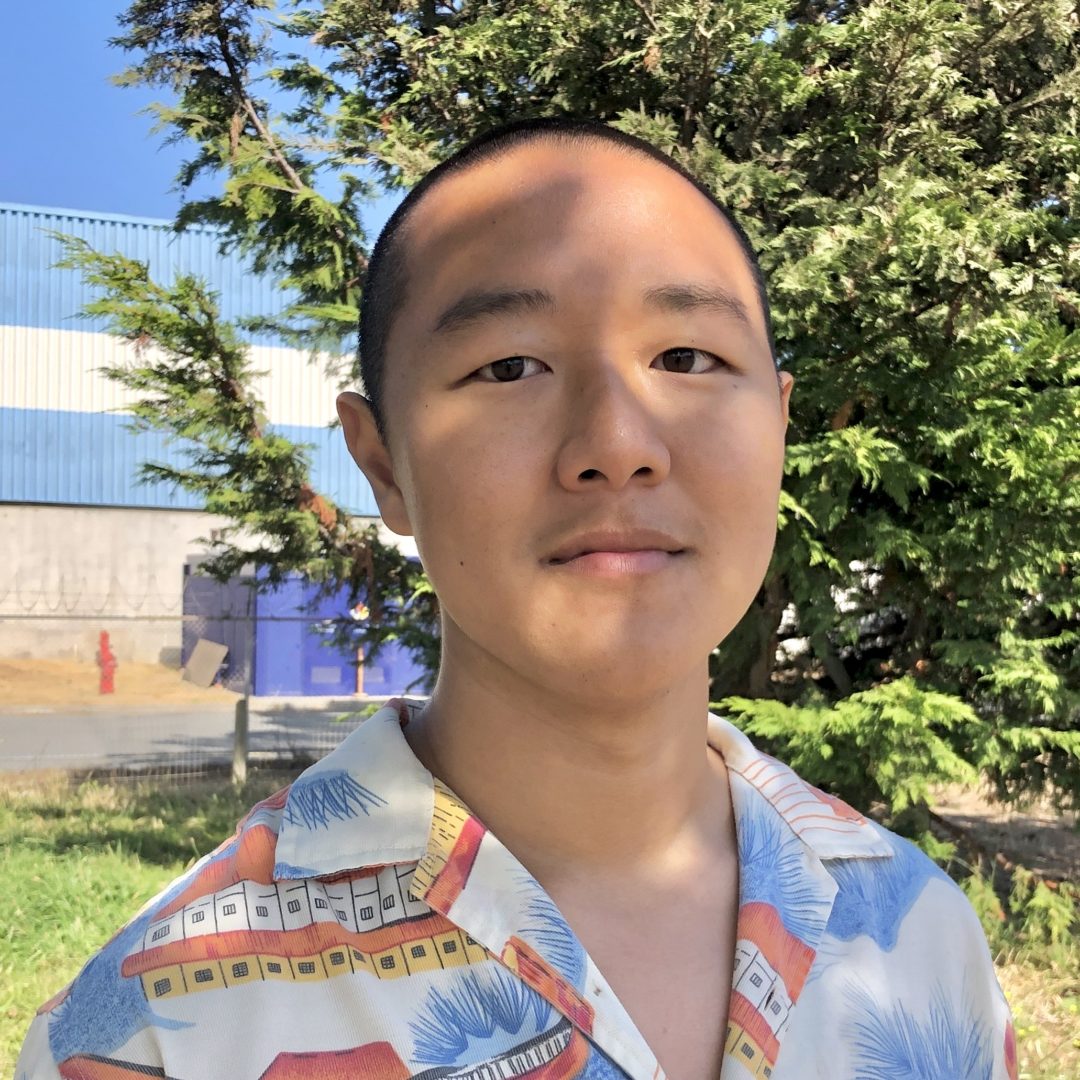Deputy Editor Sydney Van To talks to Mai Der Vang about documentary poetics, Hmong epistemology, and community building. Mai Der Vang’s Yellow Rain has been shortlisted for the 2022 PEN/Voelcker Award for Poetry Collection and is out now by Graywolf Press.

Sydney Van To: In previous interviews, you have talked about the ten years of research which went into this project. The collection has been received as a kind of “documentary poetics,” and the voice throughout is argumentative, which is part of its power. While reading, I always had to attend to the epigraphs and endnotes so that I could understand how you situated yourself. It was important to see who and what claims your poems respond to. Did you ever have the urge to write history instead of poetry?
Mai Der Vang: In terms of documentary poetics, I try to collage the history of yellow rain in such a way that the assemblage can be considered a form of poetry. I definitely went back and forth between writing history versus writing poetry. I do see the value of this work in the form of nonfiction, as a historical text that offers an investigative reportage of yellow rain. But poetry aligned more easily and naturally with the writing I was already doing. With poetry, there is dexterity in what I can do with language. I can use poetry to offer another context of the truth. Sometimes that truth can be even more compelling through the cumulative effect of poetry and its resonances, voices, echoes, lamentations, etc., which is often absent in straightforward retellings of history. The challenge is meshing these perhaps slightly opposing paradigms of writing. That’s why there are a lot of epigraphs and moments where the reader has to sift through historical information with me. I felt that providing that contextual history would support the reader to better grasp the stakes of the situation around yellow rain.
Sydney: Your writing process strikes me as representative of what one must deal with when working on “disqualified knowledges,” which is Foucault’s term for belief systems which have been invalidated within Western frameworks. We do all of the research first, and only when we feel as if we have gained enough authority do we finally speak. In your ten years of research, you did not begin writing poetry until the last several years of the project. But perhaps poetry was also a way of rejecting these assumptions about authority. On the one hand, you show that you have all of this archival research to back you up. But on the other hand, you refuse to rely on this form of authority as the ground for your voice.
Mai Der: Absolutely. The idea of authority, or the idea of official knowledge, is something I struggled with. So much about Hmong people’s worldview colliding with Western frameworks aligns with Foucault’s idea. The archival documents were so important to what I was able to learn about yellow rain, and yet at the same, they held a kind of power over how much I would be allowed to know. But while the documents serve as a form of “authority”, they weren’t the ones writing the poems, I was. This allowed me to do with the poems and documents what I wanted toward shaping a new, different, or subverted perspective on yellow rain. Having to contest with the dominant narratives of scientific and government authorities while also realizing those narratives would be prioritized over the Hmong version was basically at the heart of the yellow rain debate for me. Despite being the ones who experienced it, the Hmong were lost in it and viewed as being too backward or “disqualified” to have an objective view. It was their word against the word of a Harvard scientist. There was also the push and pull of conflicting political agendas from groups who either rejected the Hmong allegations to promote a façade of peace, or other groups who leveraged and exploited the Hmong allegations toward promoting arms development. That became clear to me as I dug more into the research. It took a while before I felt aware enough to tackle and work through the density and confusion of yellow rain, and I still have a lot of questions. But at least I know more about yellow rain now, and knowing more about it better positions me to interrogate it.
Sydney: One section in your book is about why yellow rain was the perfect weapon: because it sounds so absurd, because it could be dismissed as bee fecal matter, because the Hmong are irrational. You reversed these claims against yellow rain as a way of explaining the sinister ingenuity of yellow rain as a political weapon. The collection itself mimics your research process: of being immersed in documents, of looking things from different angles, of enacting these rhetorical reversals, and finally, ending on this note of grief.
Mai Der: I’m glad you picked up on that. In that section, I was thinking about the sinister undertones underneath the undertones, and how I could take that and flip it inside out. I was thinking about how these observations and facts sound ludicrous. They make me sound ludicrous! But what if? With yellow rain, there was so much potential to gaslight the refugees into believing that they didn’t know what was going on. This gaslighting did happen. I wanted to create a neutral and objective space for myself to be able to flip these arguments. But it was also a space to feel and express rage toward the things said about Hmong refugees.
Sydney: Yellow rain opens up many other historical events as well. Your collection is also about the other crimes inflicted upon the Hmong people, but which have been invalidated, such as feeding them poisoned pork, the mystery of sudden death sleep syndrome, or the soil destabilization project. All of these things which seem to have no firm answer, perhaps because most people just don’t care. And there’s also how yellow rain pops up in other countries and other wars. Yellow rain opens up the Secret War, but also the later 20th century, showing us how wars are fought and how they’re concealed.
Mai Der: Absolutely. Many governments, especially the United States, are notorious for covert wars and surrogate warfare. Some of these poems, and the introductory prose pieces, offer this contextual background. Those examples you cited are interesting because I didn’t expect to find those in my research. I really thought I would just be looking at yellow rain. So when I came across these adjacent issues, it made me realize the vastness of the topic and the potential to see connections between them.

Sydney: Our conversation so far reminds me of these lines from your opening poem: “I have / been shoveling upside / down. And now my eyes / stagger, my hands ache, / my legs becoming hunter, / my back a raging shadow. / I have been gardening myself into this remembrance.” I absolutely love this. What was the emotional experience for you in undertaking this research?
Mai Der: A lot of anguish, confusion, but also anticipation and a sense that I was really challenging myself in a meaningful way. Just about every poet, writer, researcher says this: I had no idea what I was getting myself into, and I didn’t imagine that it would take this long. I didn’t know then that I would write a book. But as I uncovered more, it became natural that a collection was forming. There were many moving parts to the complicated story of yellow rain that I was no expert in at all. There were a lot of things to look up and teach myself, such as the process of digging through declassified documents or the science of honeybees. In the end, as a daughter of Hmong refugees and a member of the community impacted by yellow rain, the hardest part was: “How will you be neutral? Can you be neutral?” And my response has always been that I don’t intend to be neutral. At the same time, I am aware that people will discredit me because I am Hmong. I had to come to terms with the fact that this isn’t the issue. I wasn’t writing for those people. I thought about how to balance some level of objectivity, but also allow myself to say what needed to be said.
Sydney: This dilemma of representation which you face is so similar to what Kao Kalia Yang had gone through with the Radiolab episode. How her uncle Eng Yang had all of this expertise about yellow rain which was edited out so that the Hmong would be portrayed as hysterical, irrational, emotional, biased. It’s hard to see how there could be a place for anger, anguish, and grief which could be respected in this discourse, and which does not undermine your credibility, but also for research and argumentation which does not close off these emotional registers. This mediation of voice is always present in your poems. This mediation which many people have critiqued as something limiting for the minority writer becomes generative for your poetry. When your poems finally release their anger, this anger has been earned through the painstaking research which you have done and which your poetry has performed.
Mai Der: What happened to Kalia and her uncle was unacceptable and absolutely terrible. In that moment, the power and necessity of what she expressed was both humbling and inspiring to hear. Writing these poems on yellow rain, I had to balance and contend with how to depict the soul-wrenching gut of my own emotional turmoil around the issue without compromising my argument. But I also couldn’t let that distract or determine how I would write. In the end, I’m always going to write the poems I want to write. I have to keep pressing forward regardless of this need to be objective. It’s about acknowledging the need to feel angry, and about saying: I can be angry, I don’t need to be composed anymore, I don’t need to have poise, I don’t need to hold myself together. The whole story of yellow rain was about Hmong people lacking objectivity. If that’s the case, I’m going to play that out. I’m going to be as subjective as I want to be, but with full awareness of the fact that they’ll be calling me a subjective, irrational, backward woman; and isn’t that the beauty of poetry anyway?
Sydney: It seems to me that this collection began as an intervention into the historical debate of yellow rain. But the collection ends up making an even larger intervention into the project of framing the Hmong subject. If you had begun by trying to make sense of the fragments of history, your poetry becomes about how the Hmong subject has to speak through fragmentation, speak through erasure, speak through the lack of adequate self-knowledge because of the forces of war and empire. In the poem, “We Can’t Confirm Yellow Rain Happened, We Can’t Confirm It Didn’t,” the title is initially spoken through the voice of the US government, which wants to bury the whole thing. But by the end of the poem, you see that this title can also function as the response of the Hmong people, who are tired of having to provide the burden of proof. It ends with the statement, “Here lie / the ashes / of our / sanity.” I’m also thinking of another poem in which you write, “If love is / The sacrament of digging, then / Here I hold my found into fire.” The project is not just about recovering history but recovering Hmong subjecthood and rebuilding the Hmong community through this labor of returning to one’s history.
Mai Der: There is reclamation happening, along with that sense of rebuilding of self within the larger collective. Whether I’m aware of it or not, when I look at my work after the fact, there is the reclamation of a history through a refusal to be erased. It can be hard to re-open these wounds, but that’s what poets do, they go where people don’t normally remember to go, or want to go. There has to be some degree of accountability for these crimes, these intentional acts of obfuscation and confusion, these perpetuations and perpetrations of indeterminacy, all of the gaslighting enacted upon vulnerable people in a state of transition. I appreciate that poetry can become a space for that accountability to be recognized and expressed. My parents, fortunately, had already arrived in refugee camps before yellow rain began happening. But they were aware of these stories of yellow rain. It is unclear how many of my own relatives might have been caught in yellow rain. Most people in my community know and believe that yellow rain happened. I wanted to make sure that I held to that. After reading multiple reports citing inconclusive outcomes, I wanted to interrogate the logic of “inconclusive”. If I can’t prove that yellow rain did happen, then they can’t prove that it didn’t. We leave it at this stalemate, but it’s a productive stalemate. It shows that the Hmong community didn’t lie.

Sydney: Your project seems to be doing a similar thing to Ma Vang’s work on refugee epistemology as reorienting the nature of secrecy. The Secret War which the US had waged in Southeast Asia has as its corollary the secrecy of Hmong knowledge which is invalidated, but also becomes a form of resistance because it can’t be co-opted into Western epistemologies. She has this reading of a missing baggage declaration form by Hmong refugees which symbolizes the things which are lost and irrecoverable to a people always on the run, and which thus represents the problems of archival work for Hmong historiography. What kind of historical arguments can you make when this war is supposed to be a secret and the US is intentionally destroying and withholding historical evidence? What is needed, then, is a new way of knowing. Perhaps this is what poetry offers us.
Mai Der: Ma’s work has been instrumental for me, and in leading the discourse in Hmong studies. This project does try to offer a kind of knowledge that might work for Hmong people, or if not Hmong people, at least for me, as opposed to what Western thought wants to impose. It is hard to categorize what that form of thought is. That poem “We Can’t Confirm” describes this liminal state where you can’t figure out if it’s one or the other, and which resists being pulled either way. This resistance to categorization may be some ingrained form of survival, almost a refusal to conform to what makes sense to the “civilized” mind, and a resistance toward falling in line with Western constructs which fall outside of Hmong cosmology altogether.
Sydney: It seems to me that this is also what your collages do. At first, I had read them as the physical daze of the pain of experiencing yellow rain. But for the post-memory generation, it’s also the epistemological daze of trying to figure out what had happened and realizing that everything is so indeterminate. That this is the liminal and fragmented space from which the Hmong subject must emerge.
Mai Der: It is the liminal space of emergence. But there’s also agency in this space that allows for the potential of a new state of certainty to surface. For so long, Hmong people have been shrouded in histories of uncertainty. Through migrations and wars over the centuries, there isn’t even a clear sense of where Hmong people might have come from, probably southwestern China. All of this leads me to think our history is one of not knowing one’s history. But in this not knowing, there is a kind of agency and power to push further. There’s perhaps more heft in what one can achieve through one’s work, as opposed to being from a place where one “knows everything” or when everything has already been pre-determined.
Sydney: Agency in the refusal to organize oneself. Agency in the refusal to consolidate oneself into some illusory unity. In your conversation with Kao Kalia Yang, you had described the Hmong as an “orphan citizen.” What does poetry look like that comes from an orphan citizen?
Mai Der: That’s a great question. There’s the matter of what comes out stylistically and technically, craft-wise. But there’s also the voice that emerges that does not belong anywhere, and which does not state who it is. Going back to that phrase, I even think that the word “citizen” is problematic because not everyone gets to be a citizen. And maybe just “orphan” is what we all are anyway. I think the poetry of the “orphan citizen” comes from a place where you don’t have all the answers, where there is a search for answers, but you get to a point of stasis, as opposed to the Western need to know everything. When you come from an “orphan citizen” status, you have an openness to uncertainty and surprise, and a natural ability to adapt. The poems may not conform to the standard poem or conventions of writing. I see that in my own writing. In my first book Afterland, I received comments from some readers: “this person doesn’t know how to use grammar,” “their syntax is all over the place,” or “this doesn’t make sense to me.” But I appreciated hearing that. I wasn’t writing to meet the need of the reader. I was writing to meet that new need which we were talking about earlier: that new thing emerging from this sense of uncertainty. It’s something I can’t describe or explain or name. And I’m okay with that.
Sydney: This seems to be a stylistic feature I’ve noticed among other Asian American women poets such as Hoa Nguyen, Cathy Park Hong, or Theresa Cha. People criticize their poems for improper grammar when really, it’s playful language. The racist reception of their work misses the fact that these poets are generating new ways of using language by messing with language.
Mai Der: I love all the writers you just referenced! Allowing myself to break the rules of grammar is a literal and figurative dismantling of the Western text. It’s not a complete dismantling but it destabilizes something in the reader. It’s good to allow ourselves to be unsettled by what we read, by how it comes to us, and in what form.
Sydney: My last question is about the last poem of your collection, “Yet There Is Still More.” You write, “That refugees are put somewhere to wait / That refugees are put everywhere to wait / That wait is the refugee / That a refugee is waiting / That waiting must go on.” On the one hand, you capture the horror of waiting, which remains indeterminate, which is a euphemism for the warehousing of refugee bodies, which becomes a form of living death. But also, you understand waiting as a form of perseverance, a persistence of the refugee body which critiques the nation-state by its very existence, waiting as a waiting for justice, or waiting as a waiting for history to be brought to light. What does waiting mean to you, and why did you end the collection here?
Mai Der: I end the collection here because the story of yellow rain still goes on. The reader is not given this smoking gun answer about yellow rain. We have waited this long already. There are people still waiting everywhere around the world. For that poem to come at the end of a very long book is another moment for me to offer another commentary about the ongoing struggles of refugees, and particularly Hmong refugees. The waiting which continues to happen before anything about yellow rain will be known, which is perhaps never. And the idea of never is part of the idea of waiting. This poem tries to show that this is not where the story of yellow rain ends.

Mai Der Vang is the author of Yellow Rain (Graywolf Press, 2021), and Afterland (Graywolf Press, 2017), winner of the 2016 Walt Whitman Award of the Academy of American Poets, longlisted for the 2017 National Book Award in Poetry, and a finalist for the 2018 Kate Tufts Discovery Award. Born and raised in Fresno, California, she earned degrees from the University of California, Berkeley and Columbia University. She teaches in the MFA Program in Creative Writing at Fresno State.

Sydney Van To is the deputy editor of diaCRITICS. He is currently a PhD student in the Department of English at UC Berkeley, with research interests in Asian American literature, critical refugee studies, and genre.


